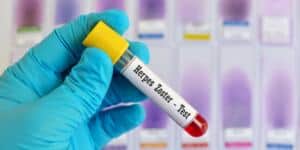Herpes, also known as Herpes simplex virus (HSV), is a type of virus that can cause an infection of the genitals, leading to genital herpes.
The symptoms may begin 2-12 days after one is infected with the virus. The symptoms can be treated, however, they may come back several times a year. The recurring symptoms are generally not as severe as the initial outbreak.
There are 2 types of viruses:
- HSV-1 is mostly spread through oral-to-oral contact through sores, saliva, and surfaces inside or around the mouth. It can also be spread to the genitals through oral sex, causing genital herpes.
HSV-1 infections are less common and less likely to have recurring symptoms than HSV-2 infections.
- HSV-2 is the type that commonly causes genital herpes. It is spread through sexual contact and is extremely contagious, even without any open wounds or sores.
The virus cannot survive outside the body, hence it cannot be transmitted by touching the same surfaces as someone who is infected.
Signs and symptoms of genital herpes:
- Pain or itching in the genital area
- Small red bumps or white blisters
- Ulcers (may form when blisters burst and ooze fluid or bleed)
- Scabs (may form when ulcers heal)
During the first time, symptoms occur, an infected person may have flu-like symptoms such as swollen lymph nodes in the groin, headache, muscle aches, and fever.
Sores can also appear since it signals an infection. An infected person can spread the virus to other parts of the body by touching a sore and then rubbing or scratching another part of the body such as the eyes and mouth. Sores in men can appear on the:
- Buttocks and thighs
- Anus
- Mouth
- Urethra (the tube that transports urine from the bladder to outside the body)
- this can be shown as pain when urinating
- Penis
- The scrotum (the area where the testes are)
Diagnosis
Viral culture
The doctor will swab or scrape the blister or sore that is infected to obtain a sample of the cells. The sample will then be placed in a dish that undergoes testing for the virus. If the results are positive, it indicates that the wound has been infected with HSV.
Limitations:
- May have false negative results
- Not as sensitive as blood tests
Polymerase Chain Reaction (PCR) test
The doctor will swab or scrape the blister or sore that is infected to obtain a sample of the cells. The DNA of the cells will then be replicated, allowing the laboratory to test for the presence of HSV in the DNA.
This test is more accurate than viral culture especially after some time has passed since the outbreak of symptoms. This test can also tell the difference between HSV-1 and HSV-2 which can help with the treatment.
Blood test
The doctor will take a sample of the blood and test it for antibodies in the laboratory. The type-specific blood test can differentiate between HSV-1 and HSV-2. Blood tests are usually for people who do not have any sores and blisters at the time of visit but believe that they may have been infected by the virus sometime in the past.
Limitations:
- May have false negative results since the infected person may not have produced antibodies yet or do not produce antibodies
- People with weakened immune systems (e.g. HIV-positive people or people who have undergone transplants) may not develop antibodies, resulting in false negative results
Treatment
There is no known cure for genital herpes, however, antiviral medication can be taken to relieve the symptoms.
- Antiviral medication helps to slow the spread and growth of a virus in the body.
- False-negative results show that the patient is not infected when the antibodies are proteins in the blood that are produced after foreign substances like viruses infect the body. They are part of the body’s immune response.
- HIV-positive means people who are infected with the human immunodeficiency virus in their bodies.

These medications do not prevent the spread of genital herpes to another person.
Complications
Having genital herpes increases the risk for:
- Other sexually transmitted infections
- Sores and blisters caused by genital herpes increase the risk of contracting other viruses during sexual intercourse (e.g. HIV)
- Infection of a newborn baby
- Mothers may expose the baby to the virus during vaginal delivery. This may result in brain damage, blindness, or death for the baby
- Inflammation of the urethra (the tube that transports urine from the bladder to outside the body)/ Urethritis
- Sores caused by genital herpes may cause the urethra to be infected and swell, causing urination problems
- Inflammation of the fluid and membrane around the brain and spinal cord/ Meningitis (rare)
- The virus may spread to other parts of the body.
- Inflammation at the rectum/ Proctitis
- The virus may spread to the rectum, especially during anorectal intercourse, causing pain near the rectum or when passing motion
Having a weakened immune system (e.g. due to HIV) may increase the risks for complications.
Signs and symptoms of viral meningitis
Early meningitis may display similar symptoms to the flu.
- Sudden high fever
- Stiff neck
- Abnormal severe headache
- Headache together with nausea or vomiting
- Confusion or difficulty concentrating
- Seizures
- Sleepiness or difficulty waking up
- Eyes being sensitive to light
- Loss of appetite or thirst
- Skin rash (sometimes)
Most people with mild viral meningitis will get better on their own. However, one should still see the doctor if he displays these symptoms.

